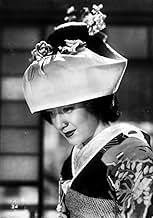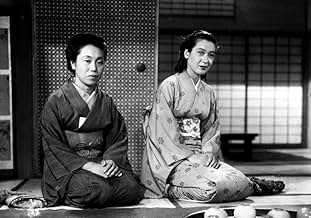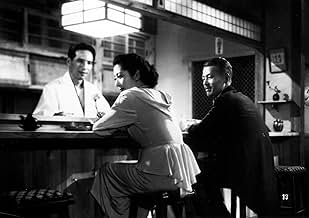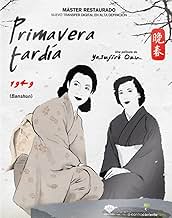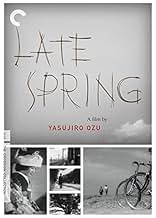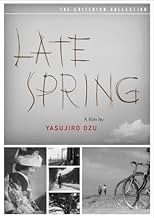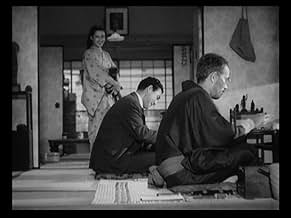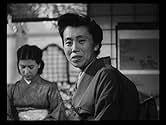Noriko ha ventisette anni e vive ancora con il padre vedovo. Tutti cercano di convincerla a sposarsi, ma lei vuole restare a casa a prendersi cura di suo padre.Noriko ha ventisette anni e vive ancora con il padre vedovo. Tutti cercano di convincerla a sposarsi, ma lei vuole restare a casa a prendersi cura di suo padre.Noriko ha ventisette anni e vive ancora con il padre vedovo. Tutti cercano di convincerla a sposarsi, ma lei vuole restare a casa a prendersi cura di suo padre.
- Regia
- Sceneggiatura
- Star
- Premi
- 5 vittorie totali
- Shige
- (as Toyoko Takahashi)
Recensioni in evidenza
Well, I would like to say that Hara did a very realistic portrayal of her character. The women of 1949 Japan had her mannerisms that we will probably find "annoying".
This is a difficult film for those who are not used to "Eastern" style of films. Especially ones from the 1940s. As long as we watch with an open mind, the theme of the film is as universal as it can get. Who knows? In 50 years, someone will make fun of Naomi Watts' acting in "21 Grams" deeming it unrealistic.
In Late Spring, a widowed Professor, Somiya (Chishu Ryu), must face the inevitability of giving up his daughter, Noriko (Setsuko Hara) to marriage. Noriko, however, wants only to continue to live at home and care for her father and insists that marriage is not for her. Yet the social pressure to marry continues to build, coming not only from her father but also from Somiya's sister Masa (Haruko Sugimura) whom she calls "Auntie", and from a friend, the widower Onodera (Masao Mishima) who has recently remarried. Masa, unrelenting, presents Noriko with a prospect named Satake who reminds her of actor Gary Cooper, but she is still reluctant. To make it easier for Noriko to decide, Somiya tells her that he is planning to remarry and she will no longer need to take care of him. Noriko's agonizes over her decision and her once beaming face increasingly carries hints of resignation. At the end, the old man sits alone peeling a piece of fruit as the ocean waves signal the inexorable flow of timeless things.
Lo sapevi?
- QuizMost of the movie takes place in Kita-Kamakura, about 30 miles from downtown Tokyo. Several years after the release of the film, the director, Yasujirô Ozu, moved with his mother to the area and spent the rest of his life there. (His tomb is also located there.) Furthermore, the film's star, Setsuko Hara, also eventually moved to the area and, as of May 2013, reportedly still lived there under her birth name, Masae Aida.
- BlooperA camera/dolly shadow is visible on the sidewalk as it follows Noriko walking.
- Citazioni
Shukichi Somiya: Marriage may not mean happiness from the start. To expect such immediate happiness is a mistake. Happiness isn't something you wait around for. It's something you create yourself. Getting married isn't happiness. Happiness lies in the forging of a new life shared together. It may take a year or two, maybe even five or ten. Happiness comes only through effort. Only then can you claim to be man and wife.
- ConnessioniFeatured in Shôchiku eiga sanjû-nen: Omoide no album (1950)
I più visti
- How long is Late Spring?Powered by Alexa
Dettagli
Botteghino
- Lordo Stati Uniti e Canada
- 13.254 USD
- Fine settimana di apertura Stati Uniti e Canada
- 6456 USD
- 6 mar 2016
- Lordo in tutto il mondo
- 19.681 USD
- Tempo di esecuzione1 ora 50 minuti
- Colore
- Mix di suoni
- Proporzioni
- 1.37 : 1
Contribuisci a questa pagina



